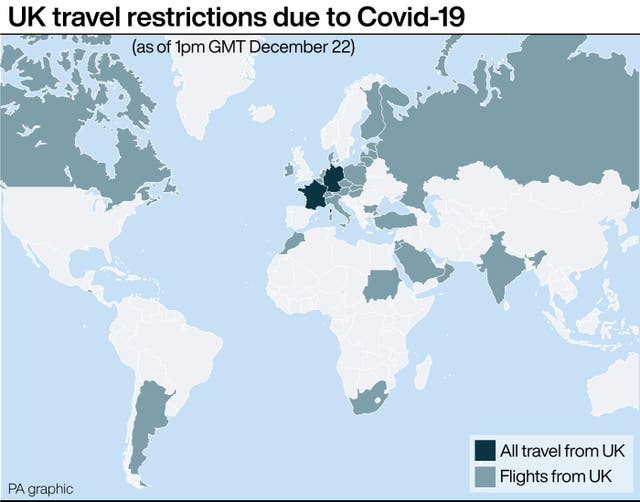
Henry Riley 7pm - 10pm
22 December 2020, 17:44

The European Commission said blanket travel bans should not be used.
Travel from the UK to the European Union should be “discouraged” due to fears about the mutant variant of coronavirus but bans on movement should be lifted, Brussels has said.
The European Commission recommended a joint approach from EU members after individual countries imposed emergency restrictions.
The most dramatic action came from France, which closed its border to lorries crossing the Channel, leading to more than 2,800 HGVs being trapped in Kent.
The EU-wide approach recommended by the commission would allow essential travel, and transit of passengers should be facilitated.
Flight and train bans “should be discontinued given the need to ensure essential travel and avoid supply chain disruptions”, the commission said.
EU justice commissioner Didier Reynders said: “Member states should take co-ordinated action to discourage non-essential travel between the UK and the EU.”
But “at the same time, blanket travel bans should not prevent thousands of EU and UK citizens from returning to their homes”.

Transport commissioner Adina Valean said: “Within the EU, it is crucial that transport workers are exempted from any restrictive measures.”
Talks between the UK and France to resolve the crisis at the Channel have included discussions on testing HGV drivers.
The EU’s recommendation suggested rapid tests should be used to avoid disruption.
The commission said: “Cargo flows need to continue uninterrupted… not least to ensure the timely distribution of Covid-19 vaccines, for example.”
UK ministers have insisted that supplies of the Pfizer/BioNTech vaccine, which is manufactured in Belgium, have not been affected by the disruption.
Despite the European Commission recommendations, Ireland extended restrictions on travel from Great Britain until December 31 which ban passenger flights and sea crossings.
By Tuesday afternoon around 2,180 lorries were being held at the former airfield site in Manston, Kent, with 632 queued on the M20 as they were blocked from using ferry routes to Dover and the Channel Tunnel.
Ms Patel said the Government is “speaking constantly” with France to achieve a resolution “in both our interests” to get freight moving again.
She defended the Government’s handling of the pandemic, insisting on BBC Radio 4’s Today programme that ministers had been “ahead of the curve” in tackling coronavirus.
More than 40 countries around the world have banned flights from the UK due to the mutant variant of coronavirus, which spreads more readily than previous strains.
Andrew Opie, director of food and sustainability at the British Retail Consortium, said the “borders really need to be running pretty much freely from tomorrow to assure us that there won’t be any disruption” to supplies of groceries.
He told the Today programme: “There is a problem potentially directly after Christmas and that is really in fresh produce, so we’re talking here about things like salad, vegetables, fresh fruit, of which the vast majority come from Europe at this time.”
The main problem was empty lorries stuck in Kent unable to head over to the continent to reload with fresh supplies, he said.

Ms Patel said that although 20% of goods come through the short straits Channel crossing, “there is plenty of food in the supermarkets”.
“We have fresh produce come in through other routes as well, through air freight and not just through the short straits, so I think we have to just take a balanced approach to this.”
Prime Minister Boris Johnson spoke to French President Emmanuel Macron on Monday and stressed that the risks of transmission posed by a “solitary driver sitting alone in the cab are really very low”.
The World Health Organisation’s European chief Hans Kluge said limiting travel to contain the spread of the new variant was “prudent” until there was more information, but supply chains for “essential goods” and essential travel “should remain possible”.
The M20 in Kent was closed on Monday night to allow the implementation of Operation Brock – which involves using a moveable barrier to keep traffic moving on the motorway whenever there is disruption at the Channel.
Meanwhile, scientific advisers continued to press the case for tougher restrictions in response to the VUI 202012/1 variant, which is 70% more infectious than previous strains.

Professor John Edmunds, a member of the Sage scientific advisory panel, told the Today programme: “Unfortunately, it does look like the virus is probably across the country already and so I do think that we might, unfortunately, have to impose tougher restrictions across the country.”
In more positive news, the chief executive of BioNTech said the company was confident its vaccine would work against the new strain.
Ugur Sahin said “we don’t know at the moment if our vaccine is also able to provide protection against this new variant”, but because the proteins on the variant are 99% the same as the prevailing strains, the firm has “scientific confidence” in the jab.
More than 500,000 people have so far received the Pfizer/BioNTech jab in the UK.

Meanwhile:
– Official figures showed a further 691 people had died within 28 days of testing positive for Covid-19 as of Tuesday and there have been another 36,804 lab-confirmed cases of coronavirus in the UK.
– More than 84,000 deaths involving Covid-19 have now occurred in the UK, according to analysis of official statistics.
– Soldiers from the British Army have been called in by the Welsh Ambulance Service to drive its vehicles and support teams responding to emergency callouts.
– Hauliers complained about conditions in Kent, with Polish driver Caspar Pecherzewski saying: “We’re stuck here and we don’t know how long it will take, this situation.”